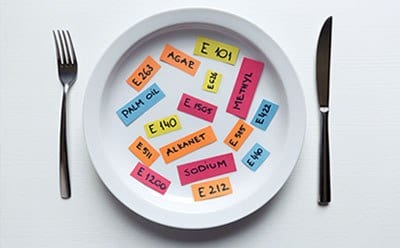Food Additive Standards

Our extensive portfolio for food additives comprises analytical standards and certified reference materials (CRMs) according to ISO 17034 and ISO/IEC 17025 double accreditation. In the European Union (EU), food additives are encoded by the “E numbers” which are assessed by the European Food Safety Authority (EFSA). E numbers are commonly listed on the labels of food and beverage products and indicate the codes for substances that are used as food additives. Our CRMs are ideal for use in several analytical applications including but not limited to pharma release testing, pharma method development for qualitative and quantitative analyses, food and beverage quality control testing, and other calibration needs.
Products
Colors (E100 – 199)
Food dyes are popularly used in the food industry to make the products look appealing. E numbers 100-199 include artificial food colors derived from petroleum, and natural food additives from sources such as vegetables, minerals, insects, or mixtures made from natural foodstuffs. The color additive is considered safe to be used in food when they comply with the regulatory body. Our portfolio provides a wide selection of neat standards to ensure accurate quality control of food products.
Preservatives (E200 – 299)
Food preservatives are substances that preserve the taste and appearance of the food while also inhibiting the fermentation, acidification, and decomposition process. They are mainly classified into two main types, antioxidants, and antimicrobials. Our high-quality preservative analytical standards for precise results include potassium sorbate, ethyl and propylparaben, sodium metabisulfite, potassium disulfite, biphenyl, 2-phenlyphenol, thiabendazole, natamycin, sodium and calcium formate, hexamethlenetetramine, sodium nitrate, sodium propionate, and acetic, malic, fumaric, benzoic and lactic acid.
Antioxidants and acidity regulators (E300 – 399)
Antioxidants are the substances that prevent or delay the autooxidation of fatty acids and enzyme-catalyzed oxidation as it causes deterioration of food products making it inedible for human consumption.
Acidity regulators are organic or mineral acids, bases, or buffering agents that are used to control or alter the pH of food products on a specific level essential for the preservation and safety of food. Insufficient pH control and leads to the growth of unwanted bacteria that could be harmful to humans. Achieve a high degree of accuracy and precise results with our CRMs and analytical standards.
Thickeners, stabilizers, and emulsifiers (E400 – 499)
Emulsifiers are the food additives that maintain the homogeneity of two or more immiscible phases such as oil and water in food products. Stabilizers are the substance added to maintain the physio-chemical state of food products. While thickeners are substances used to increase the viscosity of food. The purpose of these food additives is to maintain consistency in texture and to prevent the separation of ingredients.
We offer high-purity reference materials and analytical standards such as D-Sorbitol, mannitol, glycerin, glycerol, beta cyclodextrin 1,2-propanediol to deliver accurate and reliable results.
pH REGULATORS AND ANTI-CAKING AGENTS (E500 – 599)
Anti-caking agents are the substances that are added in small amounts to prevent clumping of food particles by absorbing the excess of moisture, and for easy transport and packaging.
Our ammonium chloride and potassium gluconate pharmaceutical secondary standards and stearic acid CRM will ensure reliable results for your special application.
Flavor enhancers (E600 – 699)
Flavor enhances are added to improve the natural flavor of food, they are normally added to commercially produced food to increase its taste and make them more appetizing.
We offer standards like L-glutamic acid and L-glutamic acid monosodium salt hydrate, maltol and ethyl maltol analytical standards, and glycine and L-leucine CRMs from TraceCERT® required in your testing applications.[SS1]
Antibiotics (E700 – 799)
Antibiotics are substances that can prevent the growth of microorganisms in animals and humans. Some foods such as meats, eggs, etc. contain antibiotics, as antibiotics are injected to farm animals to treat them from infectious diseases or to prevent them from getting infected.
Our range of VETRANAL® analytical standards includes bacitracin A, tetracycline, chlortetracycline, and oxytetracycline hydrochloride, benzathine penicilline G tetrahydrate, spiramycin from Streptomyces sp., and monensin sodium and salinomycin monosodium salt hydrate.
Glazing agents, gases and sweeteners (E900 – 999)
Glazing agents are the substances that form a waxy coating around the food to give a shiny and polished appearance while protecting the surface from water loss.
Sweeteners are the food additives that are natural and artificial substances added to increase the sweet taste of food and beverages.
Nitrogen, oxygen, and carbon dioxide gases are mainly used by the food industry during production, packing, storing, and transporting food items. Gases thus used help in prolonging the shelf-life, retain the freshness, lower production cost, and increase the production volume.
Browse our comprehensive portfolio for food and beverage standards and reference materials to suit your special application needs.
Additional additives (E1100 – 1599)
We also supply additional food additives such as cholic acid EP reference standard, pullulan CRM standard, triethyl citrate, and triacetin analytical standard along with benzyl alcohol and propylene glycol pharmaceutical secondary standards to cover all your testing requirements.
To continue reading please sign in or create an account.
Don't Have An Account?